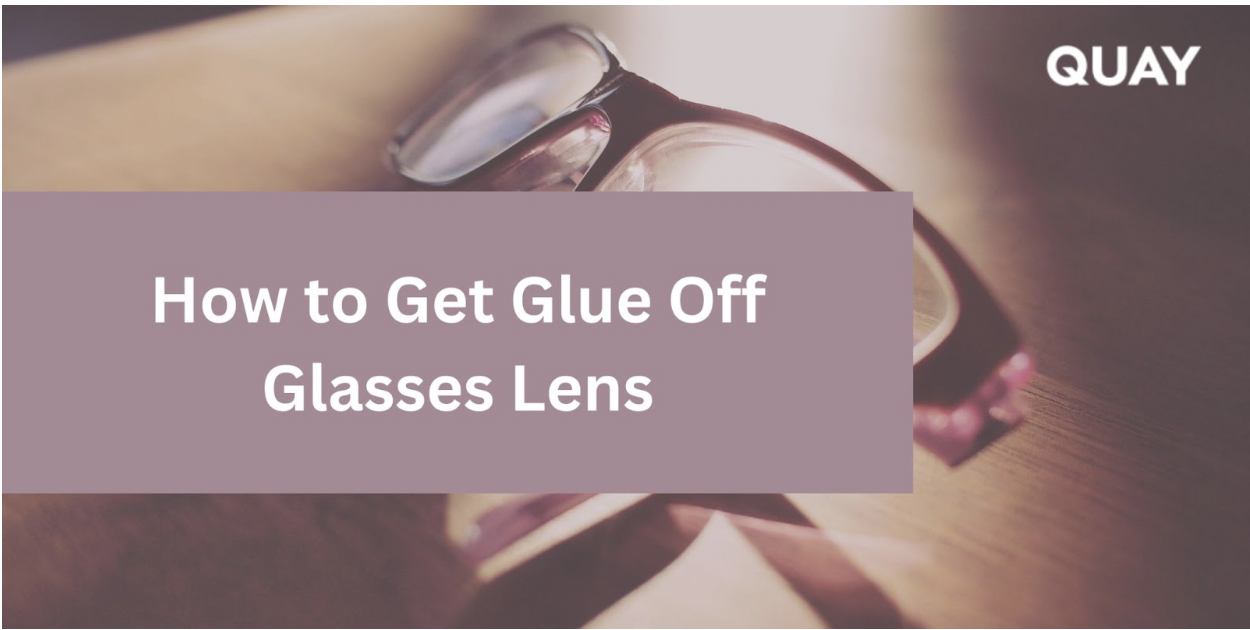
Got glue on your glasses? In this guide, you will learn how to escape that sticky situation. That residue not only looks unsightly but can seriously obstruct your vision. The good news is you don't need to panic or rush to a professional.
With a few simple household items and the right approach, you can safely remove even stubborn glues without damaging your expensive lenses or frames. No special equipment is required; it is just common supplies with a bit of patience.
This guide will walk you through proven methods for tackling different types of glue, such as craft glue, super glue, or residue from price tags. Let's get your glasses clean, clear, and back to perfect condition.
Accidental spills happen during crafting or repair projects involving glues like super glue. Handling glue bottles near your workspace increases the chances of unintentional contact with your glasses.
Misapplication of glue occurs during glasses repair attempts. Applying too much glue to fix frames or screws may result in overflow onto the lens.
Handling items with glue on your fingers can transfer sticky residue. Touching your glasses without cleaning your hands can leave smudges or glue marks on the lenses.
Improper storage can put glasses at risk. Storing glasses near glue containers or on glue-coated surfaces can cause the glue to transfer to the lenses.
These causes commonly result in glue-smearing lenses, emphasizing the need for caution in such situations.
Your glasses are essential to your daily life, and ensuring their longevity is worth the extra care. But if you’re considering a fresh look, these sunglasses for women are the perfect upgrade.
Having these items ready ensures you can safely and effectively clean glue off your glasses lenses.
Follow these steps to safely and effectively remove glue from your glasses lenses without causing scratches or damage.
Set up a clean, flat surface with adequate lighting. Gather all necessary tools, including a microfiber cloth, cotton swabs, warm water, dish soap, and rubbing alcohol. Keep objects like sharp tools away, as they can scratch the lenses. Placing glasses on a soft towel adds stability and prevents further damage.
Dip a cotton swab in warm water mixed with a small amount of mild dish soap. Gently dab the affected area, ensuring it gets fully moistened. Allow the solution to loosen the glue for 5-10 minutes. Avoid soaking or over-wetting the lenses if they're not waterproof.
Use a plastic scraper or an old credit card to lift the softened glue gently. Work slowly to avoid applying excessive pressure. For smaller spots, use your fingernail wrapped in a microfiber cloth. Avoid using hard or metallic tools that may scratch the lens surface.
Rinse the lenses under lukewarm water to remove any residue. Apply a small amount of dish soap and rub gently using a microfiber cloth. Dry the lenses with another clean microfiber cloth, ensuring no streaks are left. Use optional lens cleaner or anti-scratch spray for extra shine.
When traditional cleaning steps aren't enough, alternative methods can help remove stubborn glue from glasses lenses. Use these approaches carefully to avoid lens damage. If you’re looking for fresh, fashionable eyewear, shop for various selections at Quay.
Apply rubbing alcohol to a cotton swab and gently dab the glue spot to loosen glue bonds. If your lenses have coatings, test on an inconspicuous area, as alcohol might affect them. After the glue softens, wipe away the residue with a microfiber cloth, then rinse the lens with warm water. Avoid excessive rubbing to prevent scratches.
Soak the lenses in warm, soapy water for 10-15 minutes to soften hardened glue. Use mild dish soap in the water to protect lens coatings. After soaking, gently remove the glue with a microfiber cloth or a plastic scraper, applying minimal pressure. Rinse the lenses thoroughly and dry them without leaving streaks.
Select a lens-safe glue remover specifically designed for eyewear. Apply a small amount to a cotton swab and work it over the glue spot without touching unaffected areas. After the glue dissolves, clean the lenses with soap and water to remove any chemical residue. Always follow product instructions for safe use.
Use proper tools: To avoid scratches or scuffs on the lens surface, always use non-abrasive tools like microfiber cloths, cotton swabs, or plastic scrapers.
Test cleaning agents: Before applying rubbing alcohol, dish soap, or glue remover, test them on an inconspicuous lens edge to confirm they don't cause discoloration or damage.
Avoid excessive pressure: Apply light pressure when scraping or wiping glue to prevent cracking lenses or rubbing off protective coatings.
Keep lenses wet during cleaning: Use water or cleaning agents to maintain moisture and reduce friction that could damage lens coatings while removing glue.
Work in a controlled area: Use a clean, stable surface to prevent dropping or sliding glasses, which can lead to scratches or frame damage.
Avoid heat exposure: Skip boiling water or high heat methods, which can warp plastic lenses and damage anti-reflective coatings.
Follow manufacturer guidelines: Refer to your glasses' care instructions to ensure compatibility with cleaning methods and products.
If glue remains on your glasses lenses after multiple methods have been tried, seek professional help to ensure safety. If mishandled, persistent glue can damage lens coatings or frames.
Consult an optician if you notice scratches, discoloration, or permanent marks on your lenses. Professionals have access to specialized tools and solvents designed for delicate eyewear materials.
Request professional assistance when dealing with premium lenses like anti-reflective or polarized models. These coatings are extremely sensitive and prone to degradation if incorrect cleaning agents are used.
Choose experts if you've used harsh chemicals that could compromise lens integrity. They can assess potential damage and provide effective treatment or repairs.
Removing glue from your glasses lenses doesn’t have to be stressful when you use the right tools and techniques. A careful and patient approach can restore your lenses without causing scratches or damage.
To protect your eyewear, always prioritize safety and precision during the process. Explore our affordable collection of glasses and frames at Quay to replace your old glasses if it is damaged beyond repair.
Don't hesitate to seek professional assistance if the glue proves too stubborn or you’re unsure about certain methods. Your glasses are essential to your daily life, and ensuring their longevity is worth the extra care.
Use warm water and a mild dish soap solution to remove glue from glasses safely. Soak the lenses to soften the glue, then gently scrape off excess with a plastic scraper or old credit card. Wipe the lenses clean using a microfiber cloth and finish with a lens cleaner or anti-scratch spray for a clear finish.
Can I use rubbing alcohol to remove glue from glasses lenses?
Yes, you can use rubbing alcohol to remove glue. Apply it carefully with a cotton swab to loosen glue bonds. However, always test on a small, inconspicuous area first to ensure it doesn’t damage lens coatings.
You’ll need a microfiber cloth, warm water, mild dish soap, rubbing alcohol (optional), cotton swabs, a plastic scraper or old credit card, a small bowl, and optional lens-safe glue remover or anti-scratch spray.
Is it safe to use glue removers on glasses lenses?
Only use a lens-safe glue remover. Apply it carefully to avoid contact with unaffected areas. Be sure to clean your glasses thoroughly afterward to remove any chemical residue.